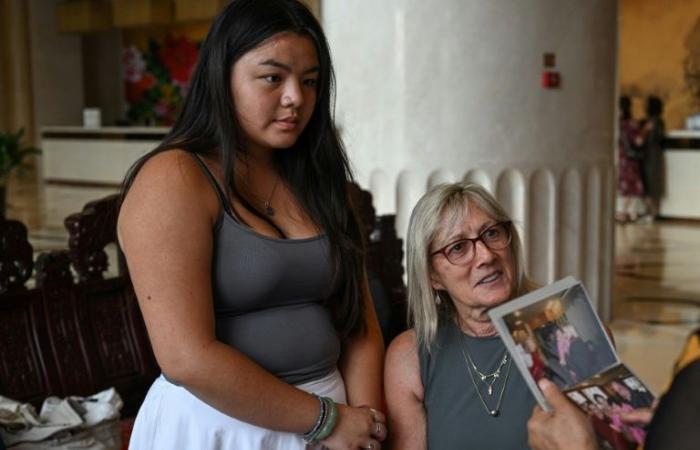Amid the rubble of a wasteland in southwest China, Loulee Wilson slips a handful of stones into a bag. A souvenir from the site where she believes she was abandoned as a baby.
She was found, shortly after her birth, wrapped in a blanket in front of a now-demolished factory in the city of Dianjiang, then placed in an orphanage before being adopted by a couple in the United States.
Now a 19-year-old student, Loulee Wilson is one of a growing number of Chinese adoptees returning to their homeland in the hope of meeting their birth parents.
“If I find them, it would be incredible. But I don’t know if I will succeed,” she told AFP. “It would help me learn more about my history.”
His case is not unique: many abandonments were made by parents fearing violating the one-child policy, in force until the end of 2015.
More than 82,000 children born in China have been adopted by American families since 1999, according to State Department figures, mainly girls and in the 2000s, when Beijing rigorously enforced birth restrictions and laws relating to to adoptions abroad were more flexible.
As these children now reach adulthood, the demand for family reunions is “very, very strong,” says Corinne Wilson, Loulee’s adoptive mother. “If they’re looking to find out where they come from, there’s a part of them that’s proud of being Chinese.”
Corinne is the founder of Roots of Love, one of several organizations created in recent years to reconnect adoptees with their loved ones in China.
With her daughter, they set off on the rural roads of Dianjiang, 150 kilometers from the big city of Chongqing, to find biological families.
Using leaflets with the name, age and photo of Loulee Wilson and other adoptees, they raise awareness among village residents and try to convince them to provide their DNA.
– “No choice” –
Some populations are still hesitant to unearth the traumatic past hidden in these quiet rice fields, where birth quotas were zealously enforced.
Under the one-child policy – the restrictions of which varied in practice – couples in Dianjiang were often allowed to have a second child if the first was a girl.
However, authorities have been cracking down on unauthorized births, threatening to demolish homes, confiscate farm animals and impose huge fines, villagers told AFP. Hence the decision by couples to give their children up for adoption.
“We were forced to do it. We had no choice,” says carpenter Yi Enqing, 57, who hopes to reunite with his daughter adopted in the early 1990s. “I’m afraid she will reject us now “She must have resentment in her heart,” he confides in his sawdust-covered workshop.
In a village, a middle-aged man spits into a test tube under the tearful gaze of his wife who evokes the memory of their daughter from whom they separated in 1990.
“I looked for her for so long, but I couldn’t find her,” she sobs as a Roots of Love assistant carefully seals and packages the saliva sample. “I never wanted to leave her.”
The couple asked to remain anonymous, to preserve their privacy.
The DNA collected is then sent to a lab for analysis and comparison with existing databases. If there is a match, Roots of Love connects parents and children. This was the case last year when twins reconnected with their biological mother after being separated for nearly 20 years.
– Emotions complexes –
Such reunions can trigger complex emotions in adoptees, who experts say are often plagued by questions of identity and racial discrimination.
“A lot of Chinese adoptees express racial (or) cultural dissonance because they grew up in a very homogeneous white environment,” says Grace Newton, a researcher at the University of Chicago who studies transracial and transnational adoptions.
“It’s losing your identity, your birth culture, your birth language, your birth family,” adds Cassidy, a volunteer adoptee with the Nanchang Project, a U.S.-based organization that has reunited dozens of families since 2018. “You had your life mapped out. And suddenly, without asking your input, decisions were made for you, and you were whisked away to a new country.”
China introduced the one-child policy in 1979, fearing its population size was becoming unmanageable. The law was condemned for its implementation, which in some areas involved forced contraception, abortions and sterilizations.
This policy has been accused of increasing infanticide rates, encouraging child trafficking and permanently distorting the male/female ratio in China. This “caused serious trauma among many Chinese,” He Yafu, an independent demographer, told AFP.
Beijing eased restrictions in 2016 and, since 2021, has allowed all Chinese couples to have three children. However, the birth rate has continued to fall, creating an imbalance with ever fewer young people supporting a growing elderly population.
Loulee Wilson, for her part, is still looking for her biological parents: “I just want them to know that I’m happy and healthy, and that I’m grateful for the life that I live.”
Do you have a real estate project in mind? Yakeey & Médias24 help you make it happen!






